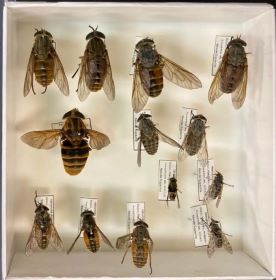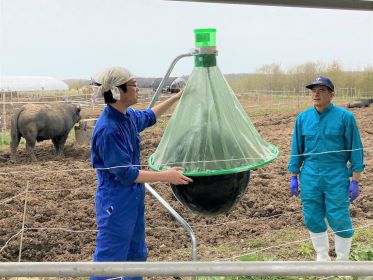- Home
- Social Action
- ★One Health Relay Report #32★
About "Development of Radiation Therapy and Diagnostic Techniques"

Profile #32: Dr. SUGANUMA Keisuke, Associate Professor
Research Center for Global Agromedicine・National Research Center for Protozoan Diseases
Obihiro University of Agriculture and Veterinary Medicine
【Research Topics】
・Development of effective control measure against horsefly
・Development of anti-trypanosome drugs
「Horseflies ~Nuisance insects in livestock farms~」
There are a number of diseases that can be transmitted by blood-sucking insects (arthropods), the most common of which are mosquitoes and ticks. Nonetheless, "horseflies" are also significant bloodsucking insects that are common in livestock farms.
When horseflies attack an animal, they often attack in swarms, with each fly sucking between 0.1 and 0.5 mL of blood. The animal becomes anaemic as a result of the infestation. Due to the excruciating pain caused by a horsefly's blood sucking, the animal may become dangerously aggressive to the attendants if the fly comes too close to the animal. In addition, horseflies are a vector for a number of diseases, including animal trypanosomiasis, a protozoan disease that causes substantial socioeconomic losses in the animal production sector in tropical and subtropical countries.
This makes horsefly control a priority in the animal production industry, but it has received less attention than other bloodsucking insects. Therefore, the goal of this study is to find ways to effectively combat horseflies (neglected blood sucking insect) and animal trypanosomiasis.


Horseflies collected in Tokachi, Hokkaido Setting up of horsefly trap in a farm
